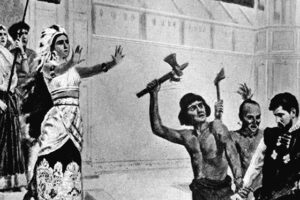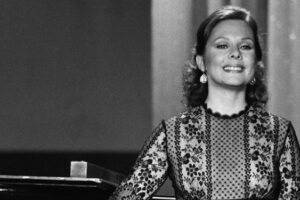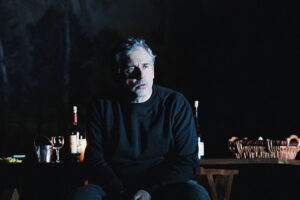

of Gyorgi Ligeti’s Le Grand Macabre from Gran Teatre del Liceu. Sure, having singers pop out of the orifices of a 20-foot tall fiberglass woman is fun and yes, the copulating couple on stage nicely captures the louche ethos of the plot’s mythical Breughelland. But this surreal work exploring our fear of death seemed to lack the gravity befitting its serious theme, relying on too many over-the-top flourishes—and a lot of potty humor—to provoke its audience.
The payoff came in the last half-hour. As Ligeti mixes original music with distorted quotations of other composers in a rich polyphonic stew, death in the form of the character Nekrotzar announces the impending apocalypse only to be revealed as a fraud when nothing changes. To a haunting passacaglia, the denizens of Breughelland conclude it’s better to make the most of their time on earth than to always live in fear.
With its mix of dark satire and seedy, oddball characters reminiscent of Mahagonny and The Rake’s Progress, Le Grand Macabre is the kind of piece that shakes up preconceived notions and puts space between the audience and the stage by underscoring the artificiality of the performance. But grasping Ligeti’s underlying theme—basically, “How should we live our lives?’’—requires burrowing through a lot of abstract music and finding dramatic continuity in a work that revels in slapstick and its own cynicism.
Ligeti conceived the opera between 1975 and 1977 as a kind of hybrid cabaret-singspiel, drawing on a 1934 play by the avant-garde Belgian dramatist Michel de Ghelderode. The world premiere in Stockholm was rocky, in part because of Ligeti’s insistence that it be performed in the native language of the audience. This created what he later called “empty spaces” for non-Swedish listeners.
Convinced an overhaul was necessary, Ligeti revised the score over 10 months in the mid-1990s, thinning out the orchestration, striking some spoken passages and putting others to music. This version, which premiered at the Salzburg Festival in 1997, is now accepted as the standard performing edition.
The Arthaus Musik DVD features a staging by the Catalan theater group La Fura dels Baus that’s sung in English and co-produced with English National Opera, Opera di Roma and Brussels’ La Monnaie. Over an overture featuring a dozen honking car horns, a short video captures a terrified woman in a dilapidated apartment, surrounded by half-eaten junk food and newspapers with scary headlines.
This turns out to be the model for “Claudia,” the figure that serves as a unit set and turns and twists throughout the performance, serving as a screen for projections and a stage door for the vocalists (I was more than once reminded of B. Kliban’s classic cartoon “The Birth of Advertising”).
In the final act, the figure splits open at the hindquarters to reveal a night club with flanking bars and swinging dancers dressed to resemble body parts. Though such flamboyant slapstick makes the work more accessible and keeps the audience on its toes, it raises questions about whether the hedonists cavorting in around the giant prone figure would really ever bother worrying about apocalyptic predictions.
Le Grand Macabre is fiendishly difficult sing, both because of the punishing tessitura and the way Ligeti and librettist Michael Meschke force the vocalists to sound vulgar while maintaining technical finesse. The Barcelona cast is mostly up to the task, with especially strong contributions from Frode Olsen as the astrologer Astradamors and Chris Merritt as the Sancho Panza-like Piet the Pot, Breughelland’s resident (and very proficient) wine-taster.
The energetic Canadian soprano Barbara Hannigan almost steals the show vocally and physically in the dual roles of Venus and Gepopo, the chief of the secret police. Countertenor Brian Asawa is suitably gluttonous and infantile as Prince Go-Go, a ruler brutalized by two corrupt ministers named Black and White. As Nekrotzar, Werner Van Mechelen is stentorian if not especially chilling, amusingly screwing up his chance to “finish the deal” on the apocalypse by losing focus and getting drunk with Piet and Astradamors.
The Liceu chorus and orchestra under Michael Boder play Ligeti’s challenging score with vigor and verve, though the English diction is a bit muddy in some choral sections. Boder, who’s leaving the Barcelona company this year for the Royal Danish Theatre and Orchestra, is also featured in a bonus segment discussing the making of Grand Macabre.
Anyone who enjoyed the New York Philharmonic’s 2010 rendition of the work or who cares about contemporary opera will surely want this DVD for their library. The imaginative, often flip staging may also appeal to more casual listeners in the way William Kentridge’s staging of Shostakovich’s The Nose did at the Metropolitan Opera and the Festival d’Aix. Underneath all the cheekiness is a serious message, though, as well as a seemingly heartfelt homage to operatic conventions delivered by turning many of those very customs upside down.























Comments